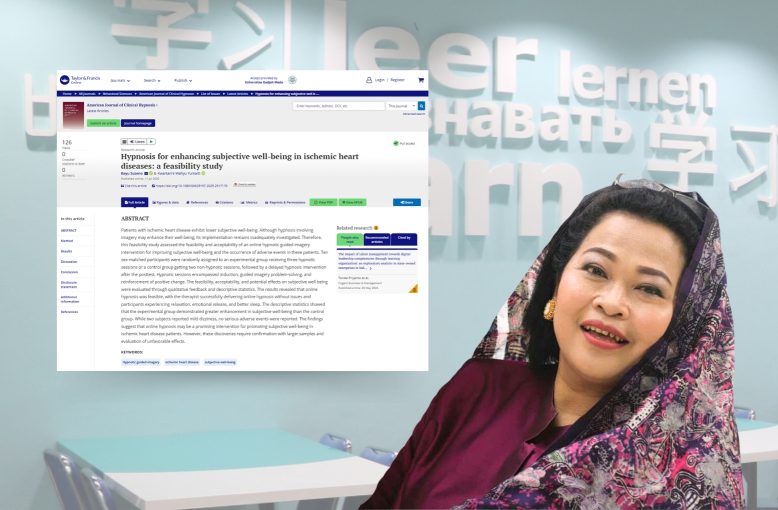
Yogyakarta, 17 Juli 2025 – Bayu Soseno dan Prof. Kwartarini Wahyu Yuniarti, M.Med.Sc., Ph.D., Psikolog, berhasil mempublikasikan hasil penelitian mereka berjudul ‘Hypnosis for enhancing subjective well-being in ischemic heart diseases: a feasibility study’ di American Journal of Clinical Hypnosis (2025), sebuah jurnal internasional bereputasi terindeks Scopus (Q2) dengan SJR 2024 sebesar 0,388 dan Impact Factor (IF) 1,3.
Penelitian ini mengangkat efektivitas Hypnotic Guided Imagery (HGI) sebagai pendekatan non-farmakologis untuk meningkatkan kesejahteraan subjektif pada pasien dengan penyakit jantung iskemik. Dengan melibatkan sejumlah pasien sebagai partisipan, studi ini menunjukkan bahwa intervensi hipnosis tidak hanya aman dan dapat diterima, tetapi juga memiliki potensi dalam mengurangi stres serta meningkatkan ketenangan dan kualitas hidup. Kontribusi ilmiah ini selaras dengan komitmen Universitas Gadjah Mada dalam mendukung pencapaian Tujuan Pembangunan Berkelanjutan (Sustainable Development Goals/SDGs), khususnya pada aspek kesehatan mental dan pengembangan terapi integratif berbasis bukti.
Berikut ini abstrak, kata kunci, dan link artikel tersebut.
Abstract. Patients with ischemic heart disease exhibit lower subjective well-being. Although hypnosis involving imagery may enhance their well-being, its implementation remains inadequately investigated. Therefore, this feasibility study assessed the feasibility and acceptability of an online hypnotic guided imagery intervention for improving subjective well-being and the occurrence of adverse events in these patients. Ten sex-matched participants were randomly assigned to an experimental group receiving three hypnotic sessions or a control group getting two non-hypnotic sessions, followed by a delayed hypnosis intervention after the posttest. Hypnotic sessions encompassed induction, guided imagery, problem-solving, and reinforcement of positive change. The feasibility, acceptability, and potential effects on subjective well-being were evaluated through qualitative feedback and descriptive statistics. The results revealed that online hypnosis was feasible, with the therapist successfully delivering online hypnosis without issues and participants experiencing relaxation, emotional release, and better sleep. The descriptive statistics showed that the experimental group demonstrated greater enhancement in subjective well-being than the control group. While two subjects reported mild dizziness, no serious adverse events were reported. The findings suggest that online hypnosis may be a promising intervention for promoting subjective well-being in ischemic heart disease patients. However, these discoveries require confirmation with larger samples and evaluation of unfavorable effects.
Keywords: hypnotic guided imagery, ischemic heart disease, subjective well-being
Publikasi ini dapat diakses pada link: https://www.tandfonline.com/doi/full/10.1080/00029157.2025.2517170
Berdasarkan kata kuncinya, artikel ini adalah luaran penelitian yang fokus pada SDG: 3.
Selamat kepada Prof. Kwartarini dan tim penulis.
Penulis & Editor: Tim UP & Humas
